For countless Christians, Easter is one of the most revered holidays of the year. For others, it is popular as a time to wear a new outfit or possibly a hat or bonnet. For the children, it can be an exhilarating occasion to seek out vividly colored eggs that have been hidden in the garden or around the house. They are told stories about the Easter Bunny. But, is this what Easter is about? What is Easter about?

Does this have anything to do with Jesus Christ and His resurrection? That question can be answered with an unequivocal no! Nevertheless, most people consider such customs harmless fun for children. But are they? In reality, they are far from harmless because they mask the truth concerning the most critical event in the history of humanity: the life of Christ, His message, crucifixion, and resurrection.
What is Easter About?
Children are told many lies about holidays: Santa Clause, the tooth fairy (not a holiday), etc., and of course, the Easter bunny. These lies are contrary to the Word of God. Eph 4:25 reads, “Wherefore putting away lying, speak every man truth with his neighbour: for we are members one of another.”
These neighbors include our children. Also, Revelation 21:8
states that “…all liars shall have their part in the lake which burns with fire and brimstone, which is the second death.” Should we set this example and lead our children to this demise? Not to mention the damage we are doing to our own souls. Perhaps these untruths are more severe than we might think. As God says in Hag 1:7, “Thus saith the LORD of hosts; Consider your ways.”
When considering Easter, perhaps an excellent place to start is with the origin of these untruths beginning with the name of Easter.
Easter is another spelling for the Anglo-Saxon goddess Eostre. The origin of this goddess, as referenced in the New World Encyclopedia, proposes a connection between Eostre and Easter with the ancient goddess Ishtar. Similarly, scholars speculate that Eostre, the Anglo-Saxon goddess of Spring whose name later led to the current English name ‘Easter,’ may be ancestrally connected to Ishtar.

It is further believed that the correct spelling of Ishtar is Istra, the Norse goddess of fertility, which was symbolized by a rabbit, thus the connection between Easter and rabbits. Rabbits are well known for their fast breeding capabilities. For many, Easter is recognized with fertility images, for example, the Easter Egg, the Easter Lily, and the Easter Rabbit.
A sufficient amount of historians chart the origin of the Easter egg to the Babylonian fable of a large egg drifting from the sky and landing in the Euphrates River, and the goddess Astarte was hatched. But who was Astarte? According to historians, Astarte is only another name for Ishtar.
In early times, it was believed that the rabbit was a hermaphrodite, which is an animal that could reproduce without losing its virginity. This fallacy led to a connection between the alleged virgin rabbit and the Virgin Mary, characterized by the painter Titian’s Madonna of the Rabbit.
When the goddess-worshipers of the past were exposed to Christianity, it was easy for them to take their old reverence to a goddess and transfer it to Mary, in opposition to Scripture and genuine Christianity. As a result, the various myths increased and triumphed.
Does it Matter to God?
Naturally, there are disparities between these myths in the different world cultures, just as there are concerning worship. But as long as we celebrate Jesus Christ’s resurrection, does it really matter? It absolutely does!
Through Moses, God made it clear that the Israelites weren’t even to mention other gods.
In Exodus 23:13 it reads:
13 And in all things that I have said unto you be circumspect: and make no mention of the name of other gods, neither let it be heard out of thy mouth.
Despite this, Christians all over the world celebrate a holiday named after other gods, namely Easter. There are many who will reason that this reproach applied only to the Jews at that time. However, we must remember through His prophet Malachi; God said in Mal 3:6, “For I am the LORD, I change not…” and Heb 13:8 says, “Jesus Christ the same yesterday, and to day, and for ever.” So then, why would it be permissible to celebrate or even mention the names of other gods today?
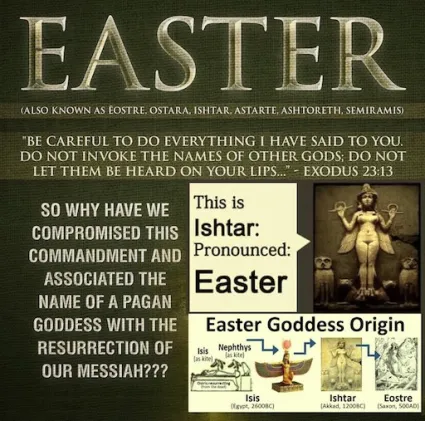
Understand that neither Christ nor the Apostles left us an example of observing such a festival. It is no wonder Jesus said in Luke 6:46, “Why do you call me, ‘Lord, Lord,’ and do not do what I say?” He is undoubtedly asking the same question today.
One of the things for which Jesus condemned the religious leaders of His day was that they discarded God’s Commandments and replaced them with their own traditions. Mark 7:6-8 quotes Jesus as saying:
6 “…Well did Isaiah prophesy of you hypocrites, as it is written: ‘This people honors Me with their lips, But their heart is far from Me.
7 And in vain they worship Me, Teaching as doctrines the commandments of men.’
8 For laying aside the commandment of God, you hold the tradition of men…” NKJV
One of God’s commandments is that His people are not to borrow pagan ideas and blend them with His observances. We are explicitly told not to think about how to serve other gods (Deuteronomy 12:30–32). However, this is precisely what traditional Christianity does!
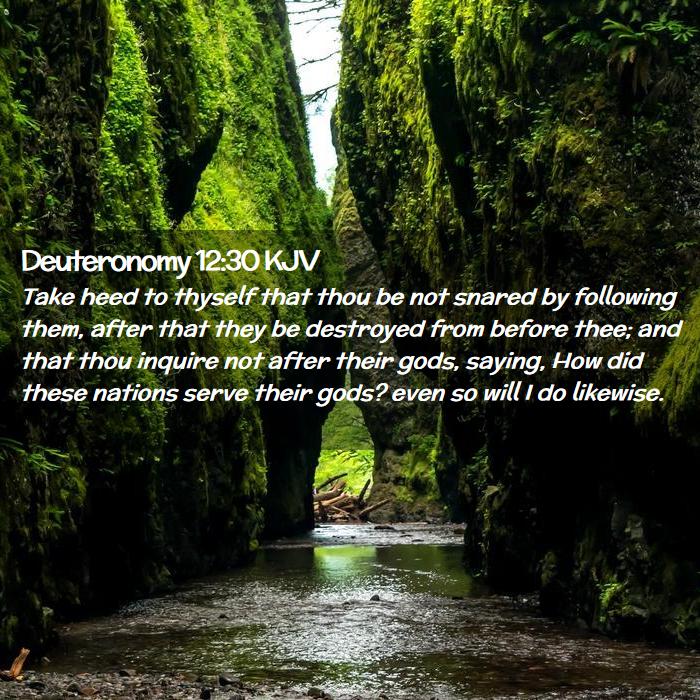
Israel was severely punished and taken into exile for idolatrous worship, as was Juda, and we are directly following in their footsteps.
In the days of the prophet Elijah, the major problem entailed combining paganism with worshipping the true God. After Elijah prayed that it would not rain for three-and-a-half years to make the people aware of their sins, Elijah and King Ahab gathered the people to settle the issue. Elijah’s question to the people was most practical: “How long will you falter between two opinions? If the Lord is God, follow Him; but if Baal, follow him”
(1 Kings 18:21).
This central question denotes a combination of the worship of the true God with heathen Baal worship.
The Christian church took many worship forms from pagan ideas and images. For example, celebrating the birth of Christ on the twenty-fifth of December in actuality came from a celebration of the sun god Saturn, the agriculture god. This celebration was known as Saturnalia, which ran from December 17-23 near the winter solstice, comprised of merriment, gift giving, and candles typically of our Christmas holidays. At the time when the Roman Empire supposedly converted to Christianity, Saturnalia became a Christian holiday honoring the birth of Jesus. In addition, greetings of “io Saturnalia!” were replaced with “Merry Christmas.” Christmas has pagan roots. For more information on Christmas, please read the article, Christmas Holidays Pagan on this website.
The pagan roots of Easter are a central problem for professing Christians. What’s more, by combining pagan customs and traditions into the worship of the true God, contrary to His command, the part of Easter that purportedly comes from the Scriptures is dreadfully flawed.
This fact is made clear in the next segment.
When was Jesus Resurrected?
Most believe that Jesus was crucified on a Friday, hence good Friday. However, more biblically knowledgeable individuals understand from Scripture that He was crucified on a Preparation Day leading up to a Sabbath. In Luke 23:52-54, it reads:
52 This man went to Pilate and asked for the body of Jesus.
53 Then he took it down, wrapped it in linen, and laid it in a tomb that was hewn out of the rock, where no one had ever lain before.
54 That day was the Preparation, and the Sabbath drew near. NKJV
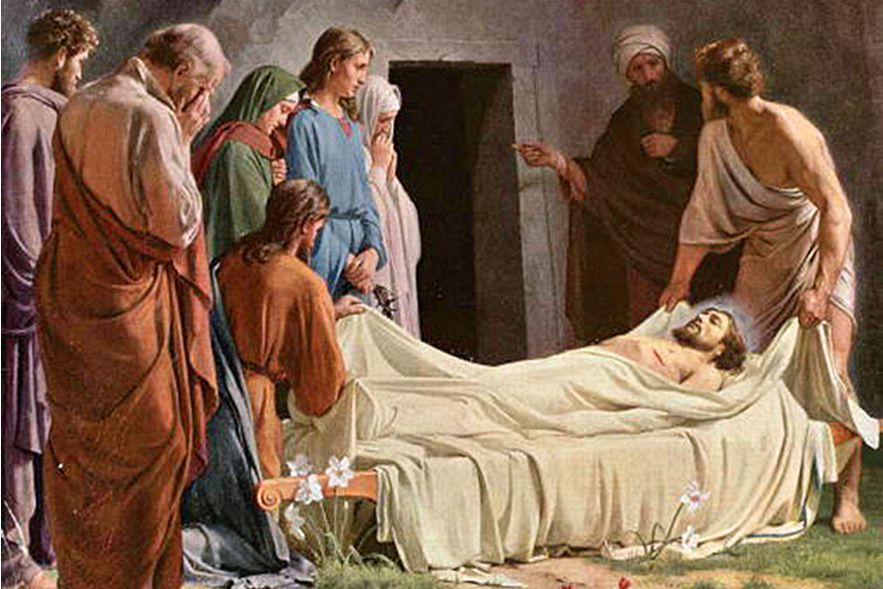
As most know, the weekly Sabbath commences at sunset on Friday and concludes at sunset on Saturday. Therefore, on the surface, it might appear that Jesus was crucified Friday morning and put in the grave very late Friday afternoon; however, this is not how it happened.
Without question, Jesus was crucified on the Preparation day for a Sabbath; however, which Sabbath? Was it the weekly Sabbath which began Friday evening at sunset and ended Saturday evening at sunset? Or is it possible it was a High Day, an annual Sabbath?
A good place to start would be how long did Jesus lay in the tomb. A more excellent place to start is how long did Jesus say He would be in the tomb? In Matt 12:39-40 Jesus responded to the Scribes and Pharisees asking Him for a sign.
39 But he answered and said unto them, An evil and adulterous generation seeketh after a sign; and there shall no sign be given to it, but the sign of the prophet Jonas:
40 For as Jonas was three days and three nights in the whale’s belly; so shall the Son of man be three days and three nights in the heart of the earth. [cf. Matthew 16:21]
Jesus said that the only sign that would be given was the sign of Jonah. As Jonah was in the belly of the whale, so will the Son of man for “three days and three nights.“ It is not possible to count three days and three nights from Friday afternoon to Sunday morning.
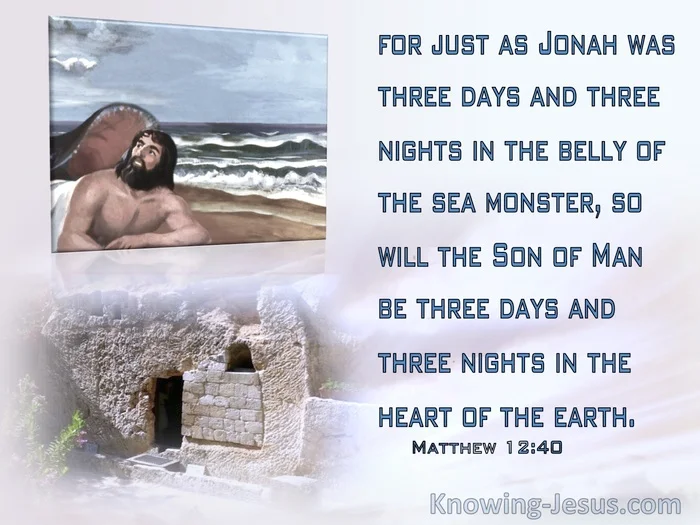
According to Scripture, Jesus was placed in the tomb right at sunset. However, some count a few minutes before sunset as day one. Friday night would be night one; the daylight segment of Saturday would be the second day, and Saturday night would make the second night. If Jesus had risen on Sunday morning after sunrise, that might be considered day three, but what about the third night? It’s not there! That is being liberal by counting a few minutes of daylight at the beginning and end as two of the three days. Christ was resurrected Saturday after sunset!
In summary, He was crucified on Wednesday and resurrected on Saturday. This summarization is how the three days and three nights are fulfilled that Jesus prophesized.
These facts can be unclear since the way we begin and end days today are different, changed by man, but perhaps the chart below helps.
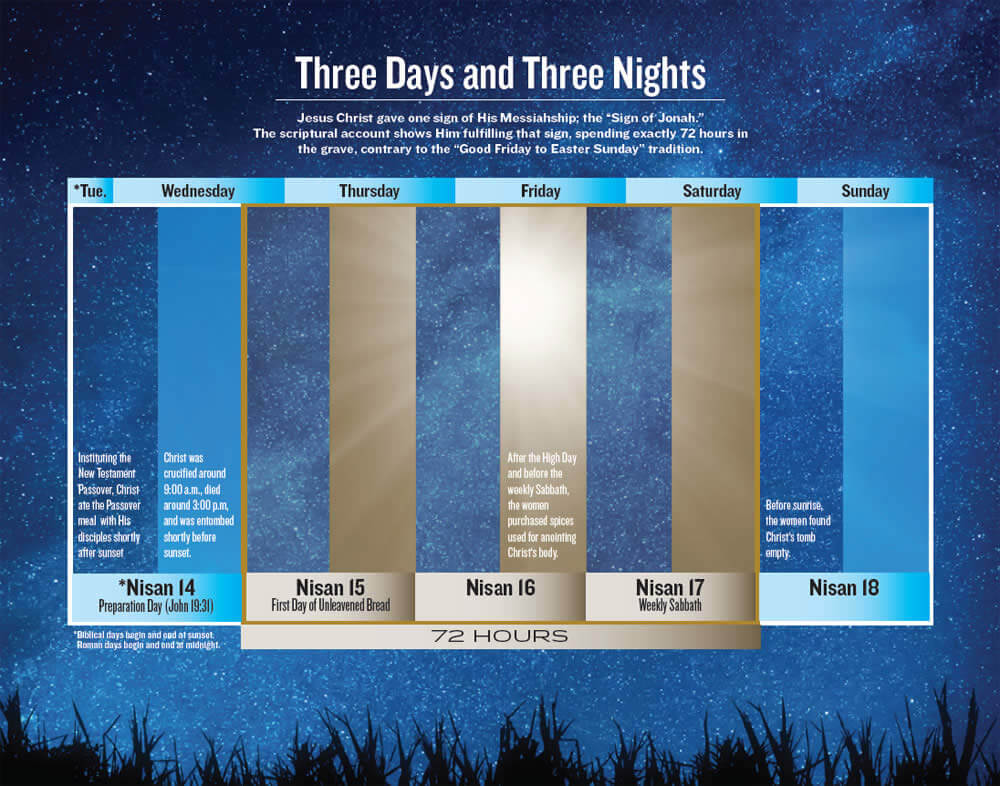
What is commonly known as the Lord’s Supper, or the Last Supper, was actually the Passover. However, some scholars deny plain scriptures and assert otherwise. Matthew, Mark, and Luke all call Jesus’ final supper with His disciples the Passover.
Here is Luke’s account in Luke 22:7-16
7 Then came the day of unleavened bread, when the passover must be killed.
8 And he sent Peter and John, saying, Go and prepare us the passover, that we may eat.
9 And they said unto him, Where wilt thou that we prepare?
10 And he said unto them, Behold, when ye are entered into the city, there shall a man meet you, bearing a pitcher of water; follow him into the house where he entereth in.
11 And ye shall say unto the goodman of the house, The Master saith unto thee, Where is the guestchamber, where I shall eat the passover with my disciples?
12 And he shall shew you a large upper room furnished: there make ready.
13 And they went, and found as he had said unto them: and they made ready the passover.
14 And when the hour was come, he sat down, and the twelve apostles with him.
15 And he said unto them, With desire I have desired to eat this passover with you before I suffer:
16 For I say unto you, I will not any more eat thereof, until it be fulfilled in the kingdom of God.
Further evidence is found in Matthew 26:17–20, where the Passover is mentioned three times in connection to His final meal. Additionally, Mark 14:12–17 mentions the Passover four times. The three (3) synoptic gospels combined (Matthew, Mark, and Luke) refer to the Passover at least twelve (12) times in relation to what is commonly called the Last Supper! There should not be any doubt that the last supper was undeniably the Passover.
Now that it has been established that the Lord’s Supper was the Passover, what is the significance? God counts each day from sunset to sunset (Genesis 1:3–5). Therefore, on the day of His crucifixion, Jesus observed the Passover with the disciples in the evening. Then, He was taken into custody that night and was crucified during the daylight portion of the Passover day. While the Passover is exceedingly special, it is not a Sabbath day.
The Passover
For a bit of history of the Passover, according to Exodus 12:6-11, on the tenth day of the month, the Israelites were to set aside a male lamb or goat and keep it until the fourteenth day and follow the Lord’s instruction.
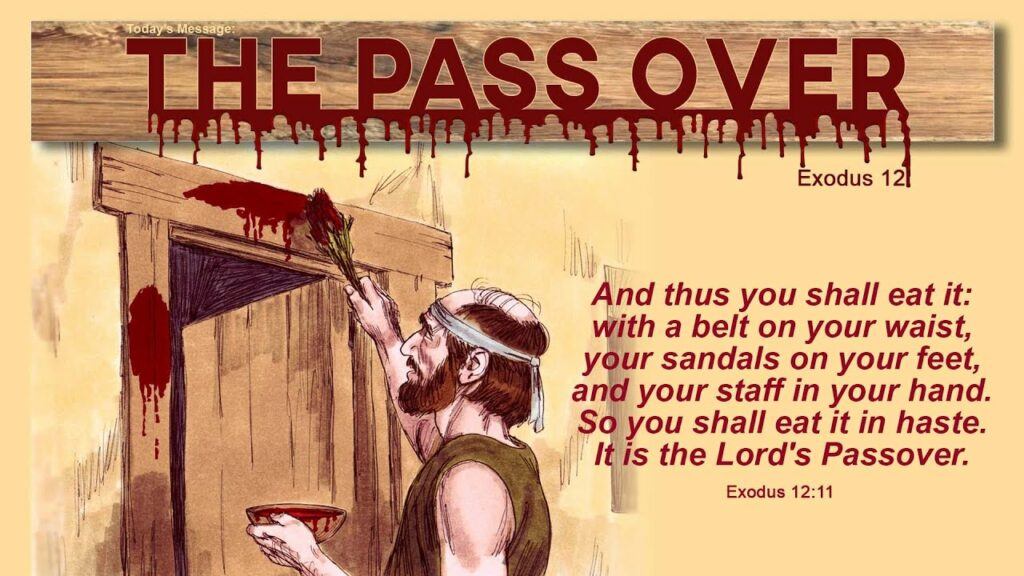
Again, the Bible counts time from sunset to sunset; the fourteenth day began that year on a Tuesday evening after sunset (actually Wednesday). The firstborn in every household had death pass over them if they were in a house marked by the blood of a sacrificed lamb or goat—this evening became known as the Passover.
In the daylight hours of Nisan 14, the fourteenth day of the month, the children of Israel “plundered” the Egyptians and traveled to the city of Rameses. This location is where the Exodus began after sunset at the beginning of Nisan 15. It took the Israelites seven days to go from Rameses to the other side of the Red Sea, and this period was commemorated as the Days of Unleavened Bread since the Israelites were journeying and did not have time for their bread to rise.
The Passover and the Days of Unleavened Bread were strongly associated, such that “Passover” is sometimes used to indicate both festivals together. The distinction between the Passover and the Feast of Unleavened Bread is unmistakably defined in Leviticus 23:5–7
and Numbers 28:16–18. In both accounts, we learn that Nisan 15, the first day subsequent to the Passover, is a day to assemble and rest from our day-to-day work. It is an annual Sabbath—a High Day—a little-understood fact with considerable significance.
John 19:31 reads:
31 The Jews therefore, because it was the preparation, that the bodies should not remain upon the cross on the sabbath day, (for that sabbath day was an high day,) besought Pilate that their legs might be broken, and that they might be taken away.
It proves challenging to comprehend the New Testament account without knowing that the Sabbath following Christ’s crucifixion was an annual Sabbath. However, with this knowledge, the picture becomes clear. The day subsequent to the Passover was a high day, an annual Sabbath where work was not to be done.
Jesus observed the Passover with His disciples at the day’s commencement soon after sunset. He was tried and crucified, then was placed in the grave late in the afternoon at the end of the Passover day. When the sunset arrived that evening, the first day of Unleavened Bread, an annual Sabbath day, had begun. These facts are addressed by the Apostle John in John 19:31 above: “…therefore, because it was the Preparation Day, that the bodies should not remain on the cross on the Sabbath (for that Sabbath was a high day), the Jews asked Pilate that their legs might be broken, and that they might be taken away.”
Of course, the Scripture in verse 33 (John 19:33) clarifies that the legs of Jesus were not broken. This fact also fulfills the Old Testament prophecy in Psalm 34:20.
The Scripture confirms that it was not the preparation for a weekly Sabbath. Furthermore, Passover is also the Preparation day for the first day of the Feast of Unleavened Bread for a high day Sabbath—an annual Sabbath, not the weekly Sabbath! Therefore, the day on
Two Sabbaths
What is commonly overlooked is that the Scriptures record two Sabbaths involving the time Jesus was in the tomb! Scripture indicates that the women rested on the Sabbath and then bought spices. Mark 16:1 reads:
1 And when the sabbath was past, Mary Magdalene, and Mary the mother of James, and Salome, had bought sweet spices, that they might come and anoint him. KJV
Notice that this took place after a Sabbath!
However, Luke 23:54-56 reads:
54 That day was the Preparation, and the Sabbath drew near.
55 And the women who had come with Him from Galilee followed after, and they observed the tomb and how His body was laid.
56 Then they returned and prepared spices and fragrant oils. And they rested on the Sabbath according to the commandment. NKJV
It is important to note that Mark states that they did not purchase the spices until after the Sabbath. However, Luke states that they prepared them and rested on the Sabbath. Therefore, these passages indicate that these women rested on the High day (the annual Sabbath), bought and prepared the spices the next day, and rested on the weekly Sabbath.
Since the Scriptures never contradict themselves, there obviously were two Sabbaths with an ordinary day in between. It is the only way to harmonize these two passages of Scripture.
Sunday Morning?
So what happened on Sunday? Why is it commonly believed that Jesus was resurrected Sunday morning? It is universally from tradition. However, we must remember that Scripture must take priority over tradition. Therefore, a thorough reading discloses that the women arrived at the tomb around dawn on the first day of the week.

Dawn on the first day of the week is when most people erroneously think resurrection occurred. However, observe what it states (even more significantly, what it does not state) in Luke 24:1–6. Notice that it does not read that He rose that morning; it merely states that He was not there when they arrived—already resurrected! Christ was resurrected Saturday after sunset!
However, some will question, “Doesn’t the Bible say that Jesus rose on Sunday morning?” The answer is not really. Notice this in Mark 16:9, “Now when He rose early on the first day of the week, He appeared first to Mary Magdalene, out of whom He had cast seven demons.”
On the surface, this appears with certainty that Jesus rose Sunday morning. However, this contradicts the other evidence we have seen that contradicts this observation. However, remember, the Bible never contradicts itself. So, which is correct? John tells us: “the Scripture cannot be broken” (John 10:35). Therefore, we must look at this verse more closely.
First, we must understand that the New Testament Greek texts did not have any punctuation as we know it today. All the letters were written in all capital letters. Texts were later written in small cursive letters. All of the words were run together with no space between them. For example, Mark 16:9 would like the example below, except instead of English letters, they were Greek letters:

Thankfully, translators and publishers made Bible reading more manageable by adding capitalization and punctuation. While this has been a blessed work, we must realize that, unfortunately, their partialities have crept into our translations, and this verse is a prime example.
The verse Mark 16:9 can be punctuated in at least two different ways. The New King James Version and many other modern translations have punctuated it according to traditional beliefs, focusing on Jesus rising early on the first day of the week. It is an apparent mistranslation. There would be a significant discrepancy regarding when the women bought and prepared the spices, and the whole course of actions as specified in the Bible would be erroneous.
Although the Bible was inspired by God and without errors in its original writings, no translation is without errors. Many of these variations do not introduce significant misunderstandings, but King James, as well as the NKJV, and other modern translations of Mark 16:9, does. It is only a matter of punctuation that makes the difference.
If we change the punctuation, it would be in harmony with the rest of Scripture; it would read this way: “Now, when He rose, early on the first day of the week He appeared first to Mary Magdalene.”
As opposed to “Now when He rose early on the first day of the week, He appeared first to Mary Magdalene, out of whom He had cast seven demons.” NKJV Notice the change in the comas. By repositioning the commas, we see that the emphasis is not on when He rose but on when He first appeared to Mary Magdalene.
The only way to know how it should be punctuated is to read it in both its immediate context and the context of Scripture overall. Given the proper order of events as shown above, It is clear now that the emphasis in this verse is not
on when Jesus rose but on when He appeared to Mary. Punctuating it this way is legitimate and is the only way to synchronize this verse with the rest of Scripture.
So, we celebrate a holiday with pagan roots, contrary to God’s Word and based on a doctrine that is dreadfully flawed scripturally. How do you suppose God sees this? Through His prophet, Hosea, He said in Hos. 4:6:
6 “my people are destroyed from lack of knowledge. “ Because you have rejected knowledge, I also reject you as my priests; because you have ignored the law of your God, I also will ignore your children.” NIV
Therefore, let us seek and hold on to the truth; Ignorance is no excuse!
Conclusion
For us to counter the sign Jesus gave (Matt 3:20) is to deny Jesus as our Savior. Hoards of heartfelt individuals have done so without recognizing that they have been misled by traditions passed from generation to generation and propagated in mainstream Christian churches.
We must follow what Paul commanded in 1 Thessalonians 5:21, “Test all things; hold fast what is good,” instead of going along with quaint sentimental customs involving rabbits, eggs, lilies, and pagan deities and days.
Some will say that it is the thought that counts. Since we are celebrating the resurrection of Jesus, it is okay. But notice what Jesus said regarding worship in John 4:23: “But the hour is coming, and now is, when the true worshipers will worship the Father in spirit and truth; for the Father is seeking such to worship Him.“
To worship the Lord sincerely is essential, but we must also worship Him truthfully, “in truth!”
Amen
Questions, comments, and concerns may be addressed below. You will receive a response.
Blessings!

I understand your zeal defend the real story of Easter Nathaniel and commend you sincerely for a very thorough and grounded article. There were certainly no bunnies hopping around nor eggs being hunted in the Biblical account of Christ’s resurrection for the dead.I agree with you one hundred percent about the lies we as a culture have told children surrounding different holidays. The story of Santa has nothing to do with Emanuel, God with us. Christ being born and living among us. That God Himself humbled himself in the form of a man and now the risen Christ is forever the God-Man seated at the right hand of the Father, interceding for the saints until the fullness of time is fulfilled for His return.
Yes, Joseph, – it’s time for all to accept the truth and worship God in Spirit and truth. The traditions of men will not get us into the kingdom.
Thanks for commenting!
Your article is very interesting!Unfortunately, it reminded me of a clip I saw some time ago. In which one told the world in turn what Easter represents, and almost no one said that it is related to the sacrifice of the Lord Jesus Christ for our sins.This made me a little sad because He gave His life for us, and we don’t even know what the biggest celebration of the year is.
Actually, Antonio, that’s pretty accurate because, as the article demonstrates, it’s really not a holiday for Christ anyway, but a holiday with pagan roots to pagan gods.
Thanks for commenting!
This was really educational, but sadly, a lot of people, especially children, think Christmas is about Santa Claus and Easter is about Easter bunnies. This is a narrative that needs to be changed. Parents should teach their kids about the risen Lord and the birth of our lord, the bible should be the center of their lives so the apply the injunction Jesus left for his disciples
Amen, Okiwelu; thanks for commenting!
While most Christians celebrate Easter Sunday and some even go easter egg hunting, I don’t. I mean, not that I don’t care about the Sunday that is believed to be the day that our Lord resurrected from the dead. What I am saying is that I don’t call it Easter but rather Resurrection Sunday.
However, I was really surprised to read a different take on the Sunday following the Triumphal entry of Jesus into Jerusalem which is commonly known as Palm Sunday. You said that Jesus resurrected on a Saturday after sunset. Hmmmm …. I have read many Bible scholars’ take on the day that Jesus rose from the dead but I have yet to read one of them claim that the resurrection took place on a Saturday.
By the way, are you saying then that Saturday is the first day of the week? (Mark 16:9, “Now when He rose early on the first day of the week, He appeared first to Mary Magdalene, out of whom He had cast seven demons.”)
I thought the 7th day is the Sabbath. Do you mind clarifying this?
Hello, Alice – Saturday is the seventh day of the week and the Sabbath. As was pointed out in the article, the original text didn’t have any punctuation. When the translators translated, they translated the verse, punctuating it according to traditional beliefs rather than the truth. The way it was punctuated, they emphasized when Jesus was resurrected instead of when He met Mary Magdalene. It is an apparent mistranslation. Jesus said He would be in the grave for three days and three nights. If Jesus died on Friday evening, it would not have been three days and three nights, only three days.
I hope this is helpful. If not, it might help to study the paragraph you are referring to or the entire article further, especially the Scriptures involved with an open mind to the truth.
Thanks for commenting!
I certainly appreciate your detailed outline of the history of the Easter holiday and how it became connected with the Holy Week events of Jesus’ death and resurrection. I do not think that secular celebration of Easter is any more a lie than taking kids to Disney Land and allowing them to be excited to see Mickey and Minnie. Parents can and should teach about the meaning of Easter while allowing their kids to have a day to celebrate and have fun. The detail that you have offered is wonderful for an adult like me to read. But for a child, combining the secular Easter Celebration with the message of the love of God for every human is good. It is taking the opportunity to combine that simple teaching that is often missing.
Jim
Greetings, Jim – You are correct; Easter Sunday itself is not a lie but a real pagan holiday that the Babylonians celebrated. However, tying it to the resurrection of Jesus is a lie. If we were to connect Disney Land to the resurrection of Jesus, that would be a lie also. Children must be entertained, and there are numerous ways of accomplishing that goal without using paganistic characters and holidays. Scripture teaches otherwise, as illustrated in the article. Pagan gods are not to even be mentioned by His people (Exodus 23:13) This includes teaching them to our children.
Thanks for commenting!
This article provides a thoughtful exploration of the history and significance of Easter and the various traditions associated with the holiday.It’s fascinating to learn about the origins of this ancient celebration and how it has evolved religiously and culturally over time.However, I’m curious about how different cultures and religions celebrate Easter around the world, as well as the similarities and differences between these traditions.Is there a common theme or symbol associated with Easter that is recognized across cultures and belief systems?I’d like to learn more about the global significance of this holiday.
Greetings, Miki; – The common theme for celebrating Easter is the resurrection of Christ. Eggs have long been associated with Easter as a symbol of new life and Jesus’ resurrection. Another egg-shaped candy, the jelly bean, became associated with Easter in the 1930s.
Thanks for commenting!
This was really educational, but sadly, a lot of people, especially children, think Christmas is about Santa Claus and Easter is about Easter bunnies. This is a narrative that needs to be changed. Parents should teach their kids about the risen Lord and the birth of our lord, the bible should be the center of their lives. The true meaning has been lost in many ways and to many people, but it is great to know that not everyone has lost the true meaning behind Easter. The crucifixion and resurrection of Christ should be thought giving the right reason behind Easter and not some fairy tale of an Easter Bunny. I love the message! Keep spreading the word of God.
Greetings Brian – The resurrection of Jesus should be celebrated without Easter altogether since it is a holiday with pagan roots with pagan gods. As pointed out in the article, God forbids us even to mention the name of these gods. Ex 23:13 quotes god as saying, “And in all things that I have said unto you be circumspect: and make no mention of the name of other gods, neither let it be heard out of thy mouth.”
Thanks for commenting!
Fascinating article! It is so true that if you would ask people nowadays, not many will know what easter really stands for. It is so sad because it is actually the most important celebration since Jesus offered himself for our sins so we can enter his kingdom. I think you will help and inspire a lot of people with your article.
Thanks for commenting, Remote Vegabond!
Unfortunately, Easter, like so many other religious holidays has become overly commercialized in our consumer economy. Just like Christmas, a lot of people tend to get too swept up in the glamor of it all and forget about the true meaning of what it is they’re supposed to be celebrating. However, others can take the opposite position and say that celebrating Easter in its current iteration goes against the teachings of the Bible and constitutes worship of other gods. What do you think is the best way to reconcile these two extremes or can they be?
Hi Matt – The best way to reconcile these differences is to direct individuals to the Scriptures highlighted in the article. One of these is Ex 23:13, which reads, “And in all things that I have said unto you be circumspect: and make no mention of the name of other gods, neither let it be heard out of thy mouth.”
Both Christmas and Easter are pagan-rooted holidays. Differences will be alleviated if we remain in the truth and not traditions and feelings.
This article is actually quite interesting. I always had a skepticism about Easter, as you touch base on Christmas and other holidays its true a lot of lies and stories are surrounded by these holidays clouding the actual truth of the matter. After reading your informative post about Easter I really do have a more understanding of the meaning and origin of the day.Thanks for enlightening me, keep up the good work and have a blessed day!
Greetings, Korey. – The truth is these holidays don’t truly represent what they claim. They have pagan roots and are not to be celebrated by God’s people. The birth of Christ and His resurrection must be observed in their own right and not tied to pagan-oriented holidays. Jesus wasn’t born on December 25th. For more on that, read this article.
God must be worshipped in Spirit and truth (John 4:24). Ex 23:13 reads, “And in all things that I have said unto you be circumspect: and make no mention of the name of other gods, neither let it be heard out of thy mouth.”
We are not to even mention the names of other gods, let alone celebrate their holidays.
Thanks for commenting!
It is sad to see how many important Biblical events have been commercialised, with Christmas and Easter ebing the two main ones. Most kids these day think of Easter as a time of getting Easter eggs, with Christmas getting Christmas presents, without knowing the real meaning behind these events.
It is interesting to see the detailed description of when did Jesus actually rose from the dead, and the theories around the Sabbath. I am confused though that at the start of the article you say what is Easter about. You then continue with “Does this have anything to do with Jesus Christ and His resurrection? That question can be answered with an unequivocal no!”
Which to me then means that there is no correlation between Easter and Jesus and his resurrection. Or did I interpret that incorrectly? I would appreciate it if you can please clarify.
Greetings LineCowley – Easter is a pagan holiday that over time has been connected with the resurrection of Christ because of the similarily of when they are celebrated (Spring), just as Christmas has been tied to the birth of Christ (even though He wasn’t born on December 25th).
The birth of Christ and His resurrection are to be celebrated in their own right and not tied to pagan holidays. We are celebrating these holidays out of traditions formulated by men. Jesus frowned upon this as He is quoted as saying in Mark 7:9, “And he said unto them, Full well ye reject the commandment of God, that ye may keep your own tradition.”
Here is the command, “And in all things that I have said unto you be circumspect: and make no mention of the name of other gods, neither let it be heard out of thy mouth.”
We are not to even mention the name of other gods, let alone celebrate on their holidays.
Thanks for commenting!
This is a very interesting point of view. I agree our society has commercialized many holidays and forgotten the reasons they have come to be. I don’t agree with how commercialized the holidays have become and I have stopped participating in that side of it. I think more people need to be reminded what holidays are all about.
Greetings, Cass. – The truth is these holidays don’t truly represent what they claim. They have pagan roots and are not to be celebrated by God’s people. The birth of Christ and His resurrection must be observed in their own right and not tied to pagan-oriented holidays. Jesus wasn’t born on December 25th. For more on that, read this article.
God must be worshipped in Spirit and truth (John 4:24). Ex 23:13 reads, “And in all things that I have said unto you be circumspect: and make no mention of the name of other gods, neither let it be heard out of thy mouth.”
We are not to even mention the names of other gods, let alone celebrate their holidays.
Thanks for commenting!
Thank you for your informative post on the truth behind Easter. I particularly think the scripture in 1 Kings 18:21 is most appropriate to our current spiritual indifference. I’ve always questioned the 3 days and 3 nights that Jesus was in the tomb and how the days and nights could be counted to provide a Friday crucifixion and a Sunday resurrection. Your article dives deep into this and further issues that are pertinent. For me, faith comes first. Understanding that Jesus is our lord and personal savior, and believing in Him takes precedence over the details of this most important point in history. Knowing him is paramount, worshipping Him in truth takes a lifetime to nurture and respond as He has instructed us through his word. Your post is a real reminder of how we can become complacent in our worship, faith and fall into incorrect truths that are not biblical nor have part in our faith. Thank you so much for this post at this time of year.
Hi Dale – For sure, 1 Kings 18:2 is most appropriate for today’s spiritual condition of the world. Faith is paramount, but it must be based on truth.
Thanks for commenting!
Easter is one of those festivals that is celebrated across the globe. The myth of the Norse goddess of fertility is interesting. Where I come from in Africa, we also associate Easter with fertility. It is the time of the year when the rains begin to pour, some trees drop their flowers. I agree with you that there will be disparity with the myths. What is important is what God says about the season. A season where God gave his only begotten son
Yes, for sure, and we should celebrate it properly.
Thanks for commenting!
I found your article to be a wonderful explanation of the Christian view of Easter. As a Christian myself, I appreciate the way you highlighted the significance of Easter as a celebration of Jesus Christ’s resurrection from the dead, and how it represents hope and new life. Your article also provides a great reminder of the importance of reflecting on our own lives and the ways in which we can experience personal renewal and transformation through faith in Jesus. Thank you for sharing this uplifting message about the true meaning of Easter. I wish more people looked at the true meaning.
Greetings, ChrisnaE. – The truth is these holidays don’t truly represent what they claim. They have pagan roots and are not to be celebrated by God’s people. The birth of Christ and His resurrection must be observed in their own right and not tied to pagan-oriented holidays. Jesus wasn’t born on December 25th. For more on that, read this article.
God must be worshipped in Spirit and truth (John 4:24). Ex 23:13 reads, “And in all things that I have said unto you be circumspect: and make no mention of the name of other gods, neither let it be heard out of thy mouth.”
We are not to even mention the names of other gods, let alone celebrate their holidays.
Thanks for commenting!
Hi Nathaniel:Thank you for the eye-opening information you’ve presented in your article about Easter. I like how you backed up your arguments with Scriptures every step of the way.Many of us agree that Scripture doesn’t contradict itself, but the answers are not always clear. You have shed light in this regard.My question to you is how do you celebrate the crucifixion, burial, and resurrection of Jesus Christ?Veron
Greetings, Veron – Personally, I celebrate the birth, crucifixion, burial, and resurrection of Jesus every day. His mercies are new every day, and I am grateful for His life and sacrifice.
Thanks for commenting!
It is so amazing how the church has adapted so many traditions that have nothing to do with Jesus, yet these traditions are installed in our children. The only thing that Jesus said to do in commemoration or remembrance is the Lord’s supper and the washing of the feet. Good Friday, easter, and Christmas although these holidays talks about Jesus they are not a command to keep but simply traditions.
Absolutely Norman; we really need to pay attention to what is going on around us and what we involve ourselves in.
Thanks for commenting!
I’m an Asian, in fact, I have no particular religion because I’m very open to receiving a lot of information.This article made me fully understand the meaning of Easter.In Eastern countries, we don’t even have Easter!The impression of Easter is to find Easter eggs, and I have benefited a lot from this article.
Hi Winter – I am happy to know that the article has benefited you.
Thanks for commenting!
I really enjoyed reading this article! It was written well, the structure was perfect with some really nice appropriate images. It was very informative and I learned quite a lot actually. I would agree with your opinion on this topic. The sweet stories about the Easter rabbit , Santa and all those made up characters really bring smiles on children’s faces but people ain’t doing them favours telling them such stuff. I have a question for you. Do you think the world would embrace the truth one day or it will continue with its delusion since it is easier that way?
Hi Danny, – I’m glad you enjoyed the article. Thanks for your question. The world will continue and increase its delusions. Scriptures address this in 2 Timothy 3:1-7.
Thanks for commenting!
Hi Nathaniel, last Sunday my pastor gave us an excellent definition of the feast of easter. In fact, it is truly the “Pass Over” that equates to exemption from sin first for Israel and then for us Christians. But hey, everyone will never have the same definition, but a big thank you for bringing the subject, I’ve been serving the Lord for 29 years now and we’re constantly learning from him. God bless you!
Thanks for commenting Marc!